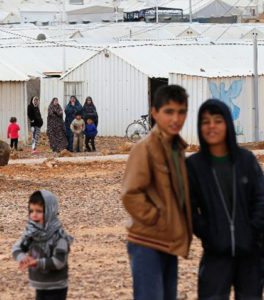Syrian exiles face poverty, uncertainty – UNHCR
The economic fallout from the COVID-19 pandemic has pushed hundreds of thousands of Syrian refugees in the Middle East into a desperate situation verging on a humanitarian crisis, the UN Refugee Agency UNHCR has warned.
The number of vulnerable refugees who lack the basic resources to survive in exile has dramatically surged as a result of the public health emergency, UNHCR says.
 The refugee hosting communities in countries in Syria’s neighbourhood experience similar hardships.
The refugee hosting communities in countries in Syria’s neighbourhood experience similar hardships.
Many refugees have lost what were already modest incomes, forcing them to cut down on the most basic needs, including food and medication.
Refugee households are also taking on additional debt and are not able to pay their rent. Serious protection risks are growing, including risks of child labour, gender-based violence, early marriage and other forms of exploitation, a statement from UNHCR said.
Since the start of the pandemic, emergency cash support has been provided to nearly 200,000 additional refugees in Egypt, Iraq, Jordan, Lebanon and Turkey.
These five countries alone host more than 5.5 million Syrians, the biggest refugee group in the world.
UNHCR is attempting to support at least 100,000 more refugees with one-off payments.
“However, many refugees still do not know how they will cope. In Jordan for example, only 17,000 out of 49,000 newly identified vulnerable families received emergency cash support, as UNHCR is lacking the funds to extend its programs,” the statement said.
“We are working with partners who support the local communities hosting refugees. Nine out of ten Syrian refugees in the region live in towns or villages and not in camps.
“The majority lives in low income areas. Host communities have shown great solidarity, but they have also suffered loss of livelihoods as a result the COVID-19 pandemic,” the statement said.
UNHCR says that beyond the immediate emergency, continued support to national systems is a priority.
“Crucial steps have been taken to ensure that refugees are included in countries’ national public health responses to COVID-19, in addition to the long-standing access for refugees to other services such as education,” it said.
Even prior to the pandemic, the majority of Syrian refugees in the region were living below the poverty line. Those most in need have been receiving cash or other types of support.
A recent survey in Jordan showed that only 35 percent of refugees said they had a secure job to return to after the lifting of COVID-19 restrictions.
UNHCR’s Syria Refugee Response and Resilience Plan in 2020 is currently updating its requirements in light of the additional needs.
But the US$5.5 billion plan was only 20 per cent funded across the region before the onset of the virus.
Prior to the COVID-19-related downturn, according to UN estimates over 80 per cent of Syrians lived below the poverty line. More than nine years of this crisis have left 11 million people in need of humanitarian assistance.












